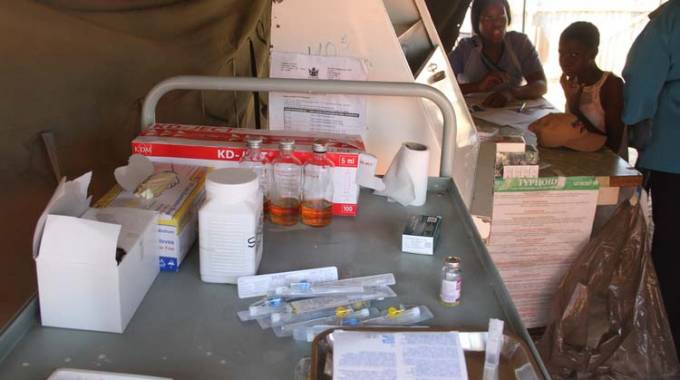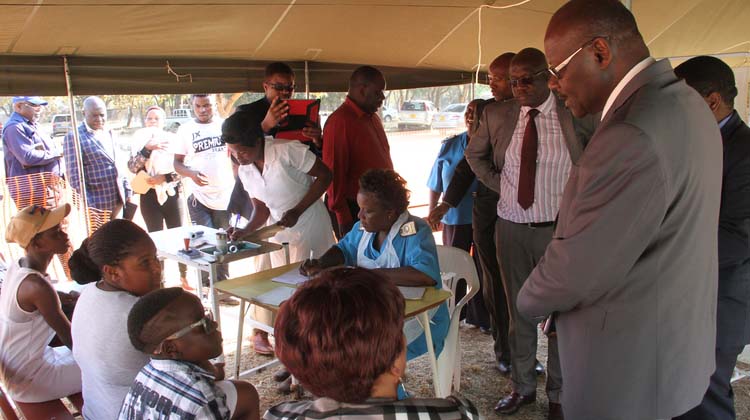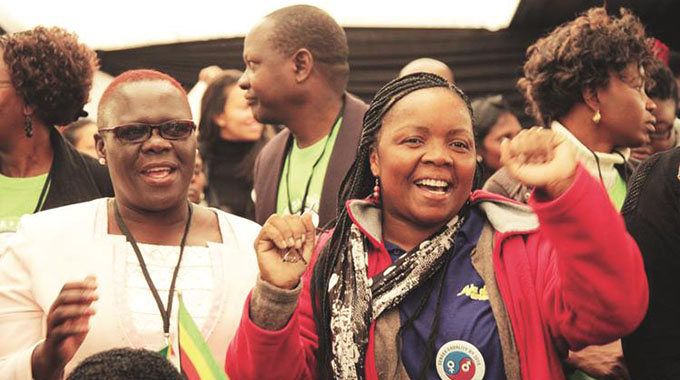Drug resistant typhoid strain: A threat to public health

Paidamoyo Chipunza Senior Health Reporter
Maria Mabheza (32) wakes up at midnight to attend to her three-year-old baby boy who continuously writhes and grumbles with abdominal pain.
Before the sun even rises, the baby starts passing watery stool, now accompanied with increased body temperature.
Her heart immediately breaks.
She is aware of seven people who have so far died of suspected typhoid and over 1 300 others treated, the majority from her community of Mkoba, which is the epicentre of the outbreak.
Mkoba, 13, 15, 18 and 20 were hard hit by the outbreak and the first cases were recorded from August 5, 2018.
According to statistics from the Ministry of Health and Child Care, children and adolescents between the ages of five and 24 years were hardest hit.
“That moment, I knew the outbreak had hit on us. How can we be spared when we live in a community where tap water supplies are erratic and when it is available it usually has a greenish colour accompanied by an odour?

Health and Child Care Minister Dr David Parirenyatwa and his Permanent Secretary Dr Gerald Gwinji interact with some of the typhoid suspected patients at Mkoba polyclinic in Gweru
“Garbage is not collected on time and sewer bursts are the order of the day?
“The borehole we rely on as an alternative water source has also been repeatedly condemned as unsafe for drinking,” said Mrs Mabheza.
Even though some people in her community with symptoms similar to typhoid were not seeking medical attention, Mabheza said she didn’t want her boy to be counted on the typhoid death statistics.
“The first thing I did when I woke up was to visit the nearest clinic. My son was immediately treated of suspected typhoid and discharged,” she said.
Little did Mabheza know of an emerging strain of typhoid, which is resistant to the traditionally used medicine, ciprofloxacin.
Two weeks later, Mabheza is back at the same clinic with the same child, this time complaining of abdominal pain and a fever but without passing any stool or vomiting.
She has also brought her eight-year older son who also started showing similar symptoms a few days before their visit to the clinic.
“They have almost the same symptoms. The younger one was here before, he was treated and discharged but is still complaining of the same problems we presented initially,” she said as she patiently waited for her turn to be attended to at one of the typhoid treatment camps at Mkoba polyclinic.
Mrs Mabheza’s son could be one of the many residents who are affected by the new strain of drug-resistant typhoid.
Typhoid is highly contagious and is caused by a bacteria called salmonella typhi.
It is passed from one person to the other through consuming contaminated food and drinking water, and it is more prevalent in places where hand washing is less frequent.
It can also be passed on by carriers who do not know they carry the bacteria.
Since 2017, Zimbabwe has recorded a dramatic increase of cases with over 4 000 cases recorded between October 2017 and June 2018.
Of late, Zimbabwe has started seeing an increase in cases of a typhoid strain that does not respond to antibiotics.
Midlands provincial medical director, Dr Simon Nyadungu said this strain of typhoid had already been confirmed in some cases in the current outbreak.
“Initially we were using ciprofloxacin but we then received results and guidance from the national level that two of the samples run were resistant to ciprofloxacin so we had to shift to azithromycin,” said Dr Nyadungu.
Dr Nyadungu said while cases seemed to have decreased in recent days, they had surprisingly begun to rise again.
He attributed the rising cases to community surveillance underway and the emerging complications to drug resistant typhoid.
“The cases that we are getting now at Gweru Provincial Hospital are patients with complications such as renal failure, anaemia and so forth. Some of them had been treated in local clinics; they get better but still come back with other symptoms.
“So when you go back to history, the patients will tell you they were once treated of typhoid related symptoms and their other family members were also treated of the same,” he said.
Dr Nyadungu said they also learnt that some patients were also self-treating themselves from home, thinking that they are better but later present with complicated symptoms to health facilities while others were not taking complete dosages, particularly those who sought treatment from private surgeries, scenarios that both increase chances of drug resistant typhoid.
“Some patients who were managed at private facilities were given prescriptions to buy the required medicine but then failed to procure the full course while others were also self-treating themselves, which is why we are having some of these complications,” said Dr Nyadungu.
Health and Child Care Minister Dr David Parirenyatwa who visited Gweru City last week also expressed concern over continued deterioration of services in most local authorities saying they were the route causes to diseases such as typhoid and its complications.
During his visit, Dr Parirenyatwa implored on Gweru City Council to ensure that it provides clean and safe water to its residents, remove garbage on time, address the issue of illegal vending among other key drivers.
“The situation is not yet very pleasing for us, the people are still working to contain the outbreak and make sure that root causes are also addressed so that the outbreak does not spread beyond Gweru,” said Dr Parirenyatwa.
Disease epidemiology and control director in the Ministry of Health and Child Care Dr Portia Manangazira said drug resistant typhoid was not unique to the city of Gweru.
In fact, she said 78 percent of typhoid cases recorded in one of the worst affected suburbs in Harare — Kuwadzana — were resistant to traditionally used medicine — ciprofloxacin.
Dr Manangazira said typhoid was now endemic particularly in Harare with its peak between October and March of each year.
“This poses a great challenge to public health particularly with the emergence of a strain that is resistant to current treatments.
“Coupled with poor sanitation and inadequate water supplies, it then means all our efforts are in vain,” said Dr Manangazira.
She said it is upon this background that Government was now looking at fast-tracking a mass vaccination programme against typhoid in selected hotspots.
Although it is initially targeted at four suburbs in Harare — Mbare, Kuwadzana, Dzivarasekwa and Budiriro being the hotspots, Dr Manangazira said Government will also be working on its introduction into the health service delivery system.
“Our antibiotics are not working, the water and sanitation situation remains pathetic in most urban settings and we hope this vaccine will keep our people safe as we continue pushing local authorities to provide adequate water and improve the sanitation situation,” added Dr Manangazira.
Funded by the Global Alliance for Vaccines and Immunisations (GAVI) to the tune of about $700 000, the initial consignment is expected to protect over 300 000 people in the selected suburbs against typhoid bacteria for between two and five years.
According to World Health Organisation, about 21 million cases of typhoid occur annually worldwide and about 220 000 people die each year, most of them children.
Majority of those affected are in Asia and Sub-Saharan Africa.
An estimated 60 percent of cases of typhoid recorded in Sub-Saharan Africa are resistant to drugs.







Comments